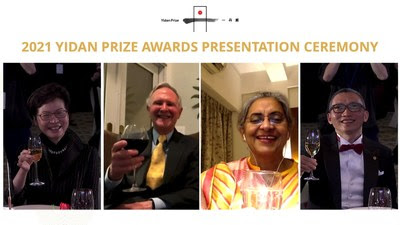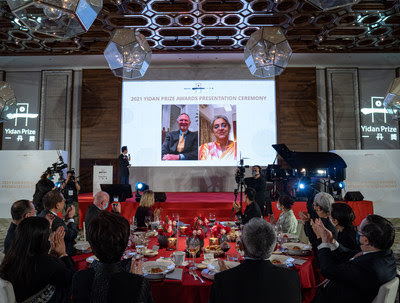HONG KONG, Dec. 6, 2021 /PRNewswire/ — The Yidan Prize Foundation, the global philanthropic foundation behind the world’s highest education accolade, hosted the 2021 Yidan Prize Summit and Awards Presentation Ceremony yesterday.

The global hybrid event gathered policymakers and education experts to debate and discuss the world’s most pressing education issues, and practical, innovative solutions for a better future. The event also celebrated and formally recognized the pioneering work of this year’s Yidan Prize laureates.
In a series of panel discussions, attendees discussed new ideas to bring fair, accessible, quality education to all. Themes included learning losses arising from COVID-19, scalable education solutions, and learning through play. UNESCO’s report on ‘Reimagining Our Futures Together: A New Social Contract for Education’ was also addressed, with attendees discussing the importance of education in ensuring a prosperous future for children.
‘Creating a Better Future Through Education’ Summit
In one panel, Professor Eric A. Hanushek, 2021 Yidan Prize for Education Research Laureate, and Paul and Jean Hanna Senior Fellow, Hoover Institution of Stanford University, stressed the critical role of teachers in enriching education quality. The distinguished panel of economists called for more support for the teachers tackling knowledge gaps in children.

Dr Rukmini Banerji, 2021 Yidan Prize for Education Development Laureate, and CEO of Pratham Education Foundation, shared why she believes children fall behind in school, and whether school curricula are too fast paced. She was joined by Professor Esther Duflo and Professor Abhijit Banerjee, 2019 Nobel Prize Laureates in Economics, to discuss how to implement meaningful changes in education—from developing scalable, effective solutions, to adapting the curriculum to every child’s level.
Panelists included Dr Sobhi Tawil, Director, Future of Learning and Innovation, UNESCO; Dr Jaime Saavedra, Senior Director, Education Global Practice, World Bank Group; and Professor Ludger Woessmann, Professor of Economics, University of Munich, among others.
Celebrating the 2021 Yidan Prize laureates
The event concluded with an awards ceremony celebrating the remarkable achievements of this year’s Yidan Prize laureates. Professor Hanushek and Dr Banerji were formally awarded the 2021 Yidan Prize for Education Research and Education Development in recognition of their ground-breaking work to improve education quality and outcomes for learners at scale.

Dr Charles CHEN Yidan, Founder of the Yidan Prize said: “Today, we celebrate Professor Hanushek’s and Dr Banerji’s work. In a world that is recovering from the pandemic, we need more effective innovations. Let’s reimagine the future: A future where innovations bring real and impactful change. This is a future we can create and a world we would all be very happy to be part of. Together, we can create a better world through education.”
Nominations for 2022 Yidan Prize
Nominations for the 2022 Yidan Prize are open until 31 March 2022. On 12 January 2022, the Yidan Prize Foundation will host a webinar to share more information about the prize, how to enter and what judges look for in a laureate. Sign up here.
About the Yidan Prize Foundation
The Yidan Prize Foundation is a global philanthropic foundation, with a mission of creating a better world through education. Through its network of innovators, the foundation supports ideas and practices in education—specifically, ones with the power to positively change lives and society.
The Yidan Prize is an inclusive education accolade that recognizes individuals or teams who have contributed significantly to education.
Photo – https://mma.prnewswire.com/
Photo – https://mma.prnewswire.com/
Logo – https://mma.prnewswire.com/
